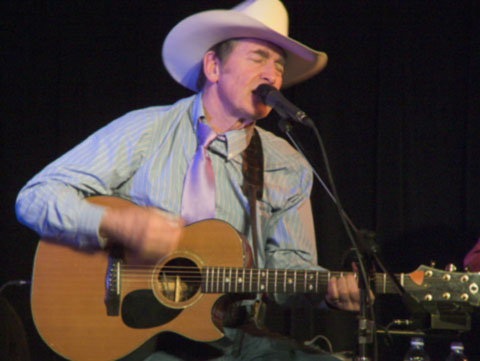Ian Dawson Tyson, CM, AOE, singer, songwriter, guitarist, rancher (born 25 September 1933 in Victoria, BC; died 29 December 2022 in Longview, AB). Ian Tyson was one of Canada’s most acclaimed folk and country music artists. A former rodeo rider, he enjoyed great success as part of the duo Ian and Sylvia with his then-wife, Sylvia Tyson. They are best known for “Four Strong Winds,” a 1963 folk anthem written by Ian. It is considered one of the best and most influential Canadian songs of all time. Tyson received many awards, including a Governor General's Performing Arts Award. He was inducted into the Canadian Country Music Hall of Fame, the Canadian Music Hall of Fame, the Canadian Broadcast Hall of Fame and the Canadian Songwriters Hall of Fame.

Early Life
The second child of George and Margaret Tyson, Ian Tyson grew up riding horses on a small farm near Duncan, BC, that was owned by his father, an insurance salesman and a British immigrant. A rodeo rider in his teens and early 20s, Ian Tyson took up the guitar while recovering from injuries sustained in a fall. He made his debut at the Heidelberg Café in Vancouver in 1956 and played with the rock'n' roll band the Sensational Stripes.
Ian and Sylvia
After graduating from the Vancouver School of Art (now Emily Carr University of Art and Design) in 1958, Tyson moved to Toronto, where he worked as a commercial artist. He performed in local clubs and in 1959 began to sing on occasion with Sylvia Fricker. As the duo Ian and Sylvia, they performed together from 1961 to 1975. They were married from 1964 until their divorce in 1975. They had one son together, songwriter-guitarist Clay Tyson.
Two of Ian Tyson's best-known songs — “Four Strong Winds” and “Someday Soon” — date from this period. Tyson wrote “Four Strong Winds” in roughly 20 minutes the day after spending an evening with Bob Dylan; he concluded that if Dylan could write his own songs, then so could he. “Four Strong Winds” has been covered by such singers as Neil Young, Johnny Cash, Judy Collins, Hank Snow, John Denver, Waylon Jennings, Sarah McLachlan, and the Victoria Symphony. “Someday Soon,” included on Ian and Sylvia's 1963 LP Northern Journey, became a minor country classic. It was recorded by Lynn Anderson, Suzy Bogguss, Glen Campbell, Judy Collins, Crystal Gayle, Tanya Tucker and others.
Concurrently, on his own, Tyson was host of The Ian Tyson Show, seen weekly on CTV (1971–75). He also had country hits in 1974 with “Great Canadian Tour” and “She's My Greatest Blessing.”
Solo Career
Following their divorce (by all accounts amicable) and the demise of the duo, Tyson spent a brief period in Nashville before moving to Alberta. He eventually settled on the T-Bar-Y ranch near Longview, southwest of Calgary, which he bought using the royalties from Neil Young’s 1978 cover of “Four Strong Winds.” Tyson divided his time between making music and breeding horses. His second LP, One Jump Ahead of the Devil (1979), included the hit “Half a Mile of Hell.” His “Moondancer” was popular in 1981. He remained only locally active during this period but served as host in the mid-1980s of CTV Edmonton's Sun Country.
His third LP, Old Corrals and Sagebrush (1983), was the first in a series devoted to the imagery and mythology of cowboy life. It was followed by Ian Tyson (1984), Cowboyography (1986), I Outgrew the Wagon (1988) and And Stood There Amazed (1990). Cowboyography, which was certified platinum in Canada, included the hits “Cowboy Pride,” “The Gift” and “Fifty Years Ago.” It also saw Tyson resume a touring itinerary in Canada and the US with his band, the Chinook Arch Riders.
In 1986, Tyson married Twylla Biblow, a fellow horse-riding enthusiast who was less than half his age. She became very active on Tyson’s ranch and was reportedly the inspiration behind his song “Nobody Thought It Would.” The couple had one daughter, Adelita, and divorced in 2008.
Tysons’s other popular songs between 1987 and 1991 included “Navajo Rug,” “Irving Berlin (Is 100 Years Old Today),” “Summer Wages,” “Cowboys Don't Cry,” “Adelita Rose,” “Casey Tibbs,” “Since the Rain” and “Springtime in the Rockies.” During this period, which has been called Tyson’s second career, he continued to concentrate on cowboy themes, such as in Eighteen Inches of Rain (1994). In 1999, Tyson released Lost Herd. The album, which injected jazz into Western standards and Tyson compositions, explores the loss of societal values. Tyson also released two collections: All the Good'uns (1996) and Live at Longview (2002); the former was certified gold in Canada. In 2005, Tyson continued to explore cowboy themes on the album Songs from the Gravel Road.
Tyson pursued his musical and ranching activities throughout the 1990s and after. His performances were usually restricted to western Canada and the western US, but included a tour of eastern Canada in 1997, as well as appearances at the Mariposa Folk Festival in 2001 (40 years after his first appearance there); with the Calgary Philharmonic Orchestra in 2003; and annually at the Elko Cowboy Poetry Gathering in Elko, Nevada.
Tyson's concert appearances became less frequent following a vocal injury he sustained in 2006. Despite a drastic change to the quality of his voice — which he described as being more “gravelly” than the voice that made him famous — he continued to attract sell-out crowds to his performances. (Writing in The Canadian, Roy MacGregor had earlier noted: “Tyson's voice works... like a pull of good whisky; rich and carrying, it edges close to the nasal passage before retreating safely, riding that fine country line that so very few voices find.”) In 2008, Tyson released another album, entitled Yellowhead to Yellowstone and Other Love Stories.
Honours and Awards
Tyson received three Big Country Awards in 1975 — outstanding performance by a male country singer, top Canadian country TV show, and best album (Ol' Eon) — and again in 1988 — male vocalist, artist of the year, and best album (Cowboyography). He won the Juno Award as male country singer of the year in 1987. His Canadian Country Music Association (CCMA) Awards include single and album of the year (for “Navajo Rug” and Cowboyography, respectively) in 1987, and male vocalist of the year in 1987 and 1988. “Someday Soon” earned ASCAP's 1992 Country Music Award. In 2000, Tyson was recognized with several awards by the Alberta Recording Industries Association, including best male recording artist and best-selling album. In 2022, the Western Writers of America ranked Tyson’s “Summer Wages” and “Navajo Rug” at No. 78 and No. 86, respectively, on its list of the top 100 Western songs of all time.
Tyson was inducted into the CCMA Hall of Honour and the Canadian Country Music Hall of Fame in 1989, the Canadian Music Hall of Fame (with Sylvia) in 1992, the Canadian Broadcast Hall of Fame in 2000, the Prairie Music Hall of Fame in 2001, and the Mariposa Folk Festival's Hall of Fame (with Sylvia) in 2006. Ian Tyson was made a Member of the Order of Canada in 1994, received a Governor General's Performing Arts Award in 2003, and was inducted into the Alberta Order of Excellence in 2006.
In 2010, Tyson was honoured with the Canadian Museum of History's Resonance Award for lifetime contributions to Canadian music. He also received honorary degrees from Athabasca University (1993), the University of Calgary (2001) and Thompson Rivers University (2007). “Four Strong Winds” was inducted into the Canadian Songwriters Hall of Fame in 2003. He and Sylvia were inducted individually in 2019.
See also Ian and Sylvia; Ian Tyson (Maclean’s Profile); Ian Tyson’s Brave New CD.
Writings
- with Escott, Colin. I Never Sold My Saddle(1994)
- "Remembering Wilf," Country, Spring 1997
- "Cowboy culture: Combining a pragmatic Texan style with the finesse of the Spanish vaquero, Alberta's cowboys still rule the open range," Equinox, Apr-May 1999
- The Long Trail: My Life in the West(2010)
Filmography
- The Working Cowboy: In Search of a Cowboy Song. Gordon Enno, director. (1992, Atlas Video). 60 min
- Tom Russell and Ian Tyson: Mano a Mano. (2008, Canyon Productions). 90 min

 Share on Facebook
Share on Facebook Share on X
Share on X Share by Email
Share by Email Share on Google Classroom
Share on Google Classroom





